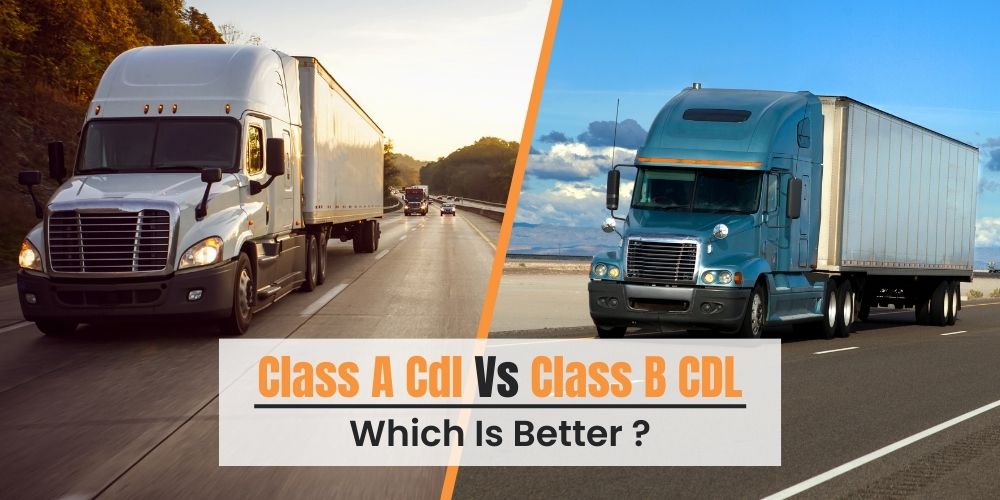Class A Vs. Class B CDL- Which is Better?

There are various factors to consider when choosing between Class A and B CDL. Check out the difference between Class A & Class B CDL and decide which is best for you.
There are two main types of CDLs: Class A and Class B. While both licenses are crucial for commercial vehicle operation. So, you might already be aware of the two classes of CDLs, but you still wonder which is the better choice for right now. This blog will explore the differences between Class A and Class B CDLs so you can decide which is best for you.
What is a Commercial Driver’s License?
A Commercial Driver’s License (CDL) is a special type of driver’s license that allows a person to operate large commercial vehicles, such as tractor-trailers, buses, and other heavy-duty vehicles used for commercial purposes. Operating commercial vehicles that transport cargo or people requires specialized training both in the classroom and on the road. Before the training, the student will need to obtain a CLP or Commercial Learner’s Permit to be able to participate in the practical component of truck driving classes, which involves learning how to operate the vehicle. Plus, the student will acquire knowledge and experience in practicing all necessary safety measures, such as inspecting the truck. Once that training has been completed, he or she will take the written exam and driving test to gain a CDL. Part of the responsibilities that accompany having a CDL includes adhering to all DOT regulations.
Types of Commercial Driver’s License?
There are two types of Commercial Driver’s Licenses (CDLs) in the United States: Class A and Class B. Each class of CDL allows the driver to operate different types of commercial vehicles with varying sizes, weights, and cargo capacities. The difference between these two relates to the weight and types of vehicles with the cargo that is allowed for each class. Both types carry their advantages regarding their effect on job prospects and salary. And starting training for either one would start your truck driving career in the right direction.
What is a Class A CDL?
The Class A CDL is a driver’s license required to operate certain types of large commercial vehicles in the United States. The gross weight of the truck and cargo can be 26,001 pounds or more, with a towing capacity of 10,000 pounds or more. With this license, you can drive 18-wheelers or any other Class B or C truck, but you can also operate many types of commercial vehicles if you get endorsements so you can work more places. However, you have to be 21 years of age before obtaining this license.
With a Class A CDL, drivers can operate vehicles including tractor-trailers, truck and trailer combinations, tanker vehicles, livestock carriers, and flatbeds, among others. To obtain a Class A CDL, applicants typically need to pass both written and practical skills tests, and in some cases, additional endorsements may be required for specific types of vehicles or cargo.
With a Class A CDL and the appropriate endorsements, you can drive the following types of vehicles:
- Tractor-trailers
- Semi-trucks
- Tanker trucks
- Livestock carriers
- Flatbed trucks
What Is the Training for a Class A CDL?
Training for a Class A Commercial Driver’s License involves both classroom instruction and practical driving experience. The classroom portion covers essential topics such as CDL regulations, vehicle systems, safety protocols, and logbook management. Hands-on training focuses on mastering the operation of a tractor-trailer, including basic and advanced driving techniques, pre-trip inspections, and on-the-road practice in various environments. Some programs also offer additional training for endorsements like Hazmat or Tanker.
Advantages of Class A CDL
As you can see, the Class A CDL has numerous advantages such as: –
1. More Job Opportunities
With a Class A CDL, you can drive a variety of commercial vehicles, including tractor-trailers, tankers, and flatbeds. They open up more job opportunities than if you only had a Class B or Class C CDL.
2. Flexibility
A Class A CDL allows you to transport a wide range of cargo, which means you can work for different companies and in different industries.
3. Job Security
The trucking industry is a crucial part of the economy, and there is always a demand for qualified drivers. With a Class A CDL, you can feel confident that you’ll have job security.
4. Higher Earning
Class A CDL holders generally earn more than those with Class B or C CDLs because they are qualified to operate larger vehicles that require more skill and experience.
What is a Class B CDL?
A Class B Commercial Driver’s License (CDL) is a type of commercial driver’s license that allows individuals to operate a different category of commercial vehicles than a Class A CDL. With the Class B CDL, you can drive a vehicle weighing 26,000 pounds or more with a towing capacity of up to 10,000 pounds. With Class B, you have more limits in the type of vehicles you can drive but after gaining the proper endorsements, you would be able to drive school buses, dump trucks, cement mixers, and delivery trucks.
To obtain a Class B CDL, you typically need to pass written knowledge tests, and a skills test, and meet other requirements such as a clean driving record and passing a medical examination. Additionally, depending on your state and the specific endorsements you need, you may have to take additional tests for endorsements like passenger transport, school bus, or hazardous materials.
With a Class B CDL and the appropriate endorsements, you can drive the following types of vehicles:
- Box trucks
- Straight trucks
- Dump trucks
- Tractor-trailers
- Segmented buses
- Large buses
What Is the Training for a Class B CDL?
Training for a Class B Commercial Driver’s License also involves a combination of classroom education and practical driving experience. The classroom portion covers essential topics such as CDL regulations, vehicle systems, safety protocols, and logbook management. Hands-on training focuses on operating and manoeuvring Class B vehicles, including basic driving techniques, advanced skills like parking and backing up and conducting thorough pre-trip inspections.
Advantages of Class B CDL
Whether you’re looking to jumpstart your truck driving career or simply want to drive temporarily, the Class B CDL offers the following benefits.
1. Easier To Obtain
Compared to class A CDL, class B CDL is easier to maintain because they require less training and experience, which makes them a more affordable option for those who are new to the industry or have limited experience.
2. Lower Cost
The Class B CDL generally has training and test requirements compared to class a CDL, which means lower tuition fees and fewer training hours for getting the license.
3. Lower Age Requirement
Some states allow individuals as young as 18 years old to obtain a class B CDL, but a Class A CDL requires drivers to be at least 21 years old.
4. Greater Job Stability
Obtaining a Class B Commercial Driver’s License (CDL) can provide job stability in the transportation industry. Like class A CDL, the trucking industry always needs experienced drivers with class B CDL, which means there is a level of job stability associated with this license.
Difference Between Class A CDL and Class B CDL
Class A CDLs are tailored towards driving the largest and most complex commercial vehicles, while Class B CDLs cover operating heavy single vehicles. The choice between the two depends on your career goals, the type of vehicles you want to drive, and the endorsements you may need for specific job opportunities.
The main differences between Class A and Class B Commercial Driver’s Licenses (CDLs):
Training and Testing Requirements
The most significant difference between Class A and Class B CDL is the requirements for training and testing. Obtaining a Class A CDL can be an extensive, lengthy, and costly process due to the complexity of handling combination vehicles and trailers, it requires passing a more comprehensive skills test. In contrast, obtaining a Class B license typically requires less training and testing, as it’s tailored to driving specific types of vehicles.
Cost and Time Investment
Obtaining a Class A CDL typically involves a higher investment of time and money due to the comprehensive training required for handling combination vehicles and trailers. On the other hand, acquiring a Class B CDL generally requires less time and financial investment compared to Class A training, as it focuses on the operation of single, heavy vehicles.
Endorsements and Restrictions
A Class A CDL is often required for specific endorsements such as Hazmat, Tanker, or Double/Triple Trailers. Depending on your state’s regulations, additional testing may be necessary for these endorsements. Conversely, while you can obtain endorsements such as Passenger or School Bus with a Class B CDL, it typically doesn’t cover endorsements related to towing multiple trailers or handling hazardous materials.
Job Opportunities
Lastly, Having a Class A CDL opens up a wider range of job opportunities, including long-haul trucking, regional hauling, freight transportation, and specialized niches such as tanker or flatbed hauling. On the other hand, a Class B CDL provides opportunities in local delivery, municipal transportation, school bus driving, and other roles that require the operation of heavy single vehicles.
How Much Does It Cost to Get A CDL?

The cost of getting a (CDL) can depend on various factors, such as the state, type of license, training program, and endorsements. The cost of state fees generally ranges from $50 to $200, while CDL training programs can cost a few thousand dollars up to $10,000 or more. For a standard CDL in Texas, the fee is $61 for a new issuance or renewal. Then the license is valid for the next 5 years and must be renewed for the same fee before it expires.
Which CDL Is Right for You?
Now you already know the difference between class A CDL and B CDLs. In short, if you’re already 21, you would qualify for Class A CDL once you’ve completed your training and have taken the steps to prepare for the tests. On the other hand, if you want to start your career right out of high school or you’re still not sure that truck driving is for you, Class B is an excellent choice. Look no further if you are interested in truck driving classes in Houston, contact Zenith Logistics Institute to find out when the next cycle begins and more about our full and part-time programs.
FAQ
1. What are the main differences between a CDL A and CDL B?
The key difference between a CDL A and CDL B is that a CDL A allows you to drive a wider range of vehicles, including combination vehicles, while a CDL B is limited to driving single vehicles within certain weight limits.
2. What should I consider when choosing between a Class A and Class B CDL?
When deciding between a Class A and Class B CDL, consider factors such as your career goals, available job opportunities, training and testing requirements, and how each option fits with your lifestyle.
3. What are the advantages of getting a Class A CDL?
A Class A CDL offers benefits such as higher earning potential, more job opportunities, and the ability to drive a variety of commercial vehicles, including long-distance and over-the-road trucking positions.
Recommended Posts

Essential Mobile Apps for Truck Drivers in 2025
February 25, 2025

How to Navigate the Commercial Driver License (CDL) Process
February 3, 2025

How Long Does It Take to Get a CDL
January 3, 2025

